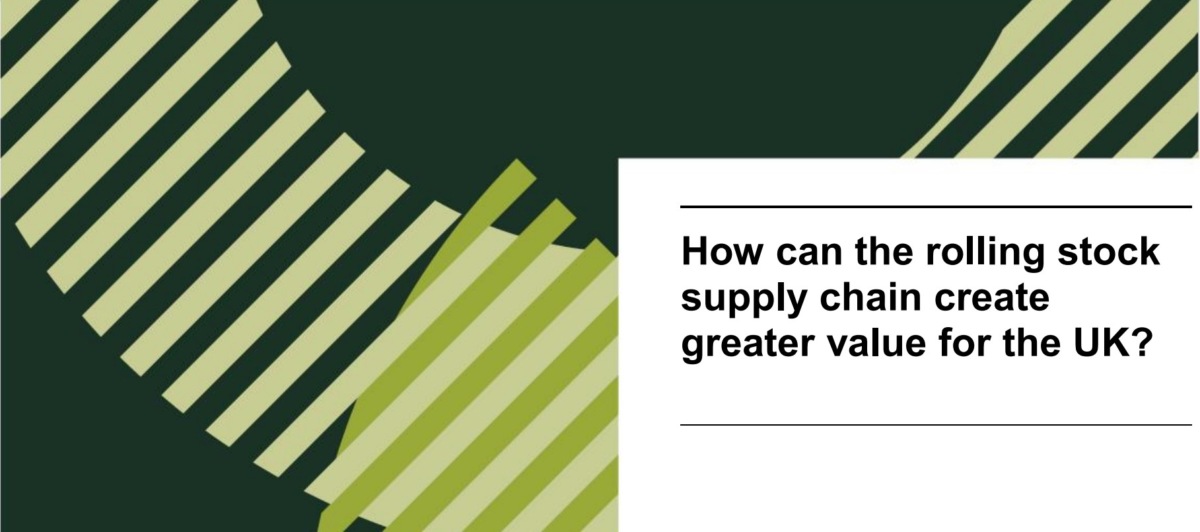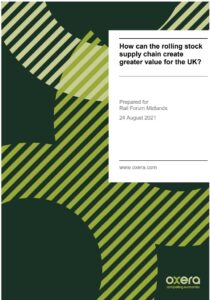“Our strategy for net zero is to lead the world in ending our contribution to climate change, while turning this mission into the greatest opportunity for jobs and prosperity for our country since the industrial revolution”
Foreword, Net Zero Strategy: Build Back Greener
With the Government’s commitment to delivering Net Zero carbon emissions after COP26, comes a watershed opportunity to enhance employment, strengthen supply chain security, expand export markets and advance the green agenda in the UK.
A research study[1] undertaken by Oxera for Rail Forum Midlands estimates that the assembly, manufacturing and maintenance of rolling stock generates £1.8bn GVA for the UK economy and supports around 27,000 jobs. However, as little as 25% of new build rolling stock content is sourced from the UK, rising to around 50% in the refurbishment market.
The analysis conducted by Oxera has been complex and, to our knowledge, no-one has attempted to break down the numbers in this way before. The work complements other wider economic analyses undertaken elsewhere and looks at a discreet part of the industry in detail. We are deeply grateful for the support of rolling stock builders and owners who have provided significant amounts of information to enable this analysis.
Whilst there may be several reasons for these low percentages, a major factor is a procurement policy driven by ‘lowest initial cost’ rather than ‘whole life value’. In addition, UK suppliers find themselves at a constant disadvantage to their overseas counterparts with no mandated (or even strongly encouraged) requirements for ‘local content’ unlike in other countries.
Transporting parts and assemblies vast distances does not provide a long-term sustainable solution especially when they can be manufactured competitively and to the same, or higher quality, by the UK supply chain. Experience from the pandemic has also demonstrated that businesses’ understanding of their complex global supply chains is limited; raising numerous questions around resilience.
Rail Forum Midlands strongly believes that significant opportunities exist to stimulate local manufacturing, driving up the percentage of UK content including through creative European collaborative partnerships that could compete with Far Eastern imports, increasing supply chain resilience and reducing carbon emissions.
Oxera’s research indicates that at least 2000 new high skilled jobs could be created in the manufacturing heartlands of the North and Midlands through the on-shoring of rail-related manufacturing back to the UK. Importantly the sector demonstrates high productivity when compared to broader manufacturing with an average employee generating almost £105,000 GVA in 2019 (compared to £65,000 in wider manufacturing in 2018).
The recently announced HS2 rolling stock contract provides a key opportunity for action. Ensuring that UK content on HS2 is maximised will not just provide new skilled jobs in the supply chain, it will also enable UK suppliers to showcase their capability to global markets – supporting a new drive for exports.
Moreover, innovative research and development in the UK supply chain is creating several potential opportunities for UK manufacturers. These include, but are not limited to:
- the Porterbrook/University of Birmingham-led Hydroflex tri-mode Class 799 showcased at COP26 in Glasgow;
- the Vivarail fast charge battery-powered class 230 also displayed at COP26 in Glasgow and the
- TDI-Eversholt developed Very Light Rail ‘Revolution’ demonstrator unit currently being showcased at Ironbridge.
All the above companies have worked closely with UK manufacturers on their developments to date and all these innovations have significant export potential which will benefit UK employment further.
Elaine Clark, CEO, Rail Forum Midlands said; “It is now vital that Government’s procurement policies support and encourage higher levels of UK content to ensure that UK plc can capitalise on current and future rolling stock procurement exercises. During the preparation of the Oxera report numerous supply chain companies, including Tier Ones, expressed the view that Government should be clearer in terms of expectations for UK content. The setting of ambitious targets would provide a much-needed starting point if we want to turn the ambition in the Net Zero Strategy into a reality.”
As the industry now embarks on a period of major reform, the below questions provide the basis for our rolling stock discussions with key decision makers in 2022.
- How will the rolling stock supply chain engage with the design of GBR such that the opportunities for both growth and smoother procurement cycles are embedded in the decision-making processes within GBR when it begins operating? For example, how will the rolling stock supply chain be represented in the national and regional workstreams?
- How will GBR take the opportunity presented by the Williams–Shapps Plan for Rail to embed the supply chain closer to the centre of the industry than has historically been the case?
- Who in the rolling stock supply chain could provide strategic insight to the Department for Transport (DfT) and GBR on the key issues that affect price, innovation and wider key purchasing criteria, and that would drive optimal value for money for the taxpayer?
- What will the government (including Network Rail and GBR) do better to reward the wider economic, social and environmental impacts of UK-based manufacturing in its procurement processes?
- How will government (including Network Rail, GBR and the DfT) reform the industry programme to provide a transparent, stable and credible forward view of the industry’s needs, which will enable the rolling stock supply chain to plan and invest in people and equipment?
[1] How can the rolling stock supply chain create greater value for the UK? Rail Forum Midlands / Oxera, 2021
The full report is available here:
-Ends-
For further information contact:
Elaine Clark – CEO
elaineclark@midlandsrail.co.uk
About Rail Forum Midlands:
Rail Forum Midlands (RFM) is a national industry body with strong regional connections including supporting the nationally and internationally important rail supply chain cluster across the Midlands; RFM has over 320 members providing products and services across all aspects of the industry. RFM actively supports the national rail agenda and strategy, encouraging collaboration, promoting members’ capabilities, leading a number of regional skills initiatives and supporting innovation and export priorities. RFM is owned and governed by its members with a Board drawn from member companies.

